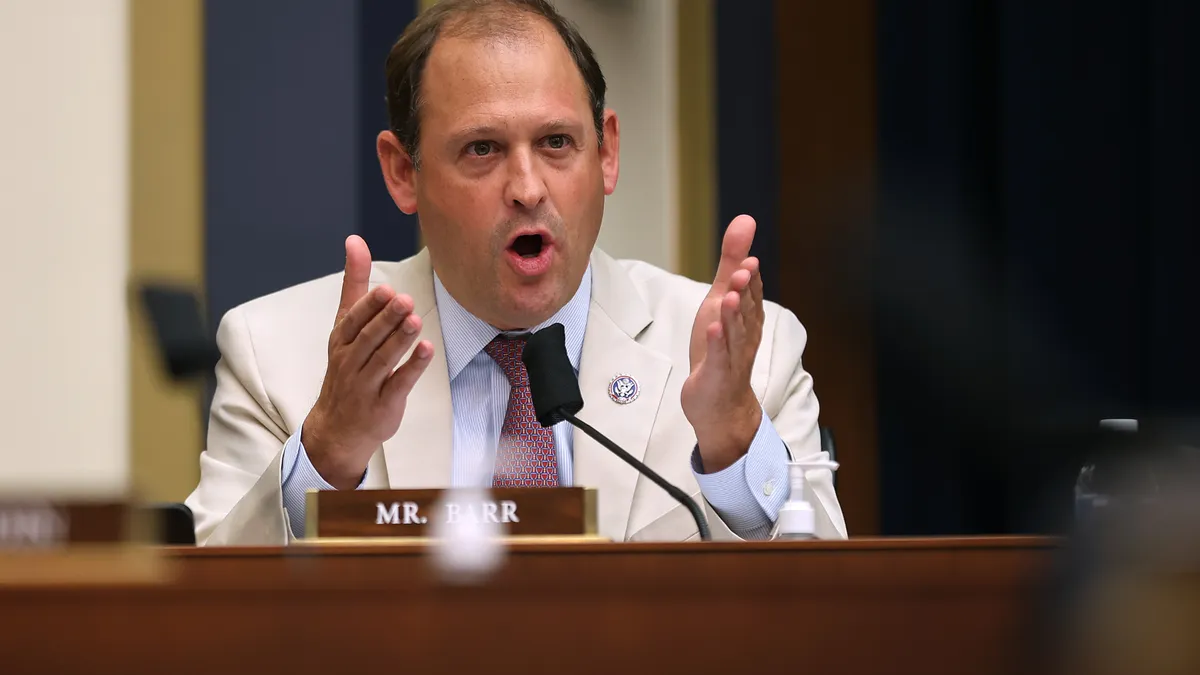A federal judge on Friday ordered the Consumer Financial Protection Bureau and its acting director, Russ Vought, not to terminate any agency employee except for cause related to job performance or conduct until March 3, when another hearing in the case will take place.
The bureau responded, however, by placing on administrative leave all employees except those asked to return to work by “the Acting Director, Chief Legal Officer, or another designee,” according to an email from the CFPB’s human capital operations manager that was seen by Bloomberg Law.
The court order came after the National Treasury Employees Union urged Judge Amy Berman Jackson on Thursday to block Vought from a “mass firing” it believed would affect 95% of the bureau’s workforce as early as Friday.
In the same Friday order, Berman Jackson demanded that the CFPB “not delete, destroy, remove, or impair” any data or agency records covered by the Federal Records Act.
Berman Jackson also ordered the CFPB and Vought not to transfer money from the bureau's reserve funds, other than "to satisfy” the agency’s “ordinary operating obligations.” That includes returning money from the CFPB’s reserve funds to the Federal Reserve, as Vought said this month he would do.
The data-related developments follow a declaration the CFPB’s former chief technologist, Erie Meyer, filed with the court Friday, warning that databases holding 12 years’ worth of information the agency has collected would soon be deleted and “irretrievably lost.”
Affected data would include “supervisory and examination records of financial institutions, enforcement action data, consumer complaints, personal consumer information, and market research records,” Meyer wrote.
Loss of data that tracks institutions’ financial behavior “would impair the Bureau's ability to identify risks and respond to emerging threats within the financial system,” Meyer wrote.
“This could destabilize markets, allow bad actors to exploit weaknesses in financial institutions, and undermine public trust in the financial system,” she wrote.
It would also open the financial system to market manipulation, Meyer asserted.
“Tech companies moving into financial services could gain an illegal competitive advantage by accessing sensitive consumer financial data or enforcement records, and the audit logs of that activity could be deleted,” she wrote. “This could result in unfair competition and undermine market integrity.”
That may serve as a reference to X Money, the payments tool set for launch this year in a partnership between card network Visa and social media platform X, owned by Trump adviser Elon Musk, who’s also seen as the architect behind the Department of Government Efficiency, which infiltrated the CFPB this month.
The deletion of CFPB data “would leave consumers without critical recourse in the event of financial harm caused by institutions under the Bureau's jurisdiction,” Meyer wrote. Further, she asserted, it would make the CFPB’s Consumer Response database “unavailable and/or unreliable, severely hamper — if not entirely take down — the Bureau’s website, and likely result in the loss of mandatory public reporting the Bureau has previously done.”
Friday’s order may represent a relief to CFPB employees, but it doesn’t apply to bureau employees who have already been terminated. The agency last Tuesday terminated roughly 70 probationary employees, then Thursday fired another 70 to 100 term employees – those whose contracts have set limits between one and four years.
Altogether, last week’s firings cut roughly 10% of the CFPB's workforce, according to American Banker.
The CFPB was not the only banking regulator to see workforce reductions last week. Roughly 500 employees at the Federal Deposit Insurance Corp., or about 8% of its workforce, accepted a deferred resignation offer from the Trump administration, Bloomberg Law reported Friday, citing a spokesperson for the agency.
The FDIC then terminated probationary employees, the outlet reported Monday, though the number of employees affected remained unclear.
An FDIC spokesperson on Friday did not detail how deeply certain units of the regulator were affected.
‘Fait accompli’
A lawyer representing the CFPB workers’ union laid out the urgency of Friday’s court action.
"I'm asking that they don't fire the entire agency tonight," Deepak Gupta, a founding principal at Gupta Wessler, told the court, according to American Banker. "I don't want to leave the courthouse without some assurance that the mass layoff is not going to happen and then become a fait accompli."
The workers’ union asked Thursday for a temporary restraining order to stop the firings, but agreed to seek a preliminary injunction instead.
That mirrors a case in the U.S. District Court for the District of Maryland, in which the city of Baltimore sued the CFPB, claiming Vought’s move to return the agency’s funding to the Fed would effectively shut down the bureau “by fiat.”
The government agreed Thursday that Vought would refrain from transferring money out of the CFPB’s reserve fund or returning money to the Fed or Treasury until Feb. 28, or upon a “contrary order” from the court, Bloomberg Law reported.
Still, in the workers’ union case, Brad Rosenberg, a Justice Department special counsel, objected to the request for a preliminary injunction.
"We don't think any preliminary relief is appropriate at this stage because we don't think the plaintiffs are likely to succeed on the merits," he said, according to American Banker.
Among the employees the CFPB terminated Thursday is Julia Barnard, who served as the agency’s student loan ombudsman since last February. Her position is mandated by the 2010 Dodd-Frank Act.
“This work matters,” Barnard said in a statement issued by the Student Borrower Protection Center. “It’s a lifeline for borrowers and a safeguard against a system that too often fails them. Dismantling this function is unconscionable and will cost real people real money.”
Delaying any further moves to slash the CFPB workforce would at least give employees time to plan and budget for their personal futures. Employees of the agency are entitled by law to 60 days’ notice of job loss. But last week’s firings came with no notice and with immediate effect.
Further, terminations for cause (probationary employees, for example, were notified that they were deemed “not fit for continued employment because [their] ability, knowledge and skills do not fit the Agency’s current needs”) left those employees without access to severance, one lawyer with the CFPB told ABC News.
In Vought’s first week as the CFPB’s acting director, the bureau’s headquarters were closed to employees, who were ordered to stop all bureau work. A tip line was also set up for people to report on employees who might be conducting work.























